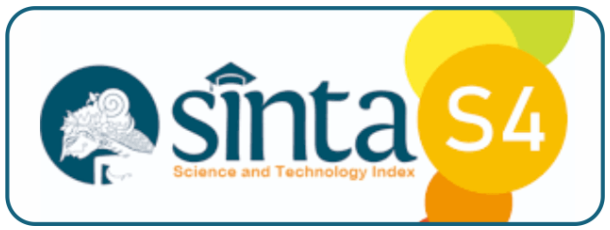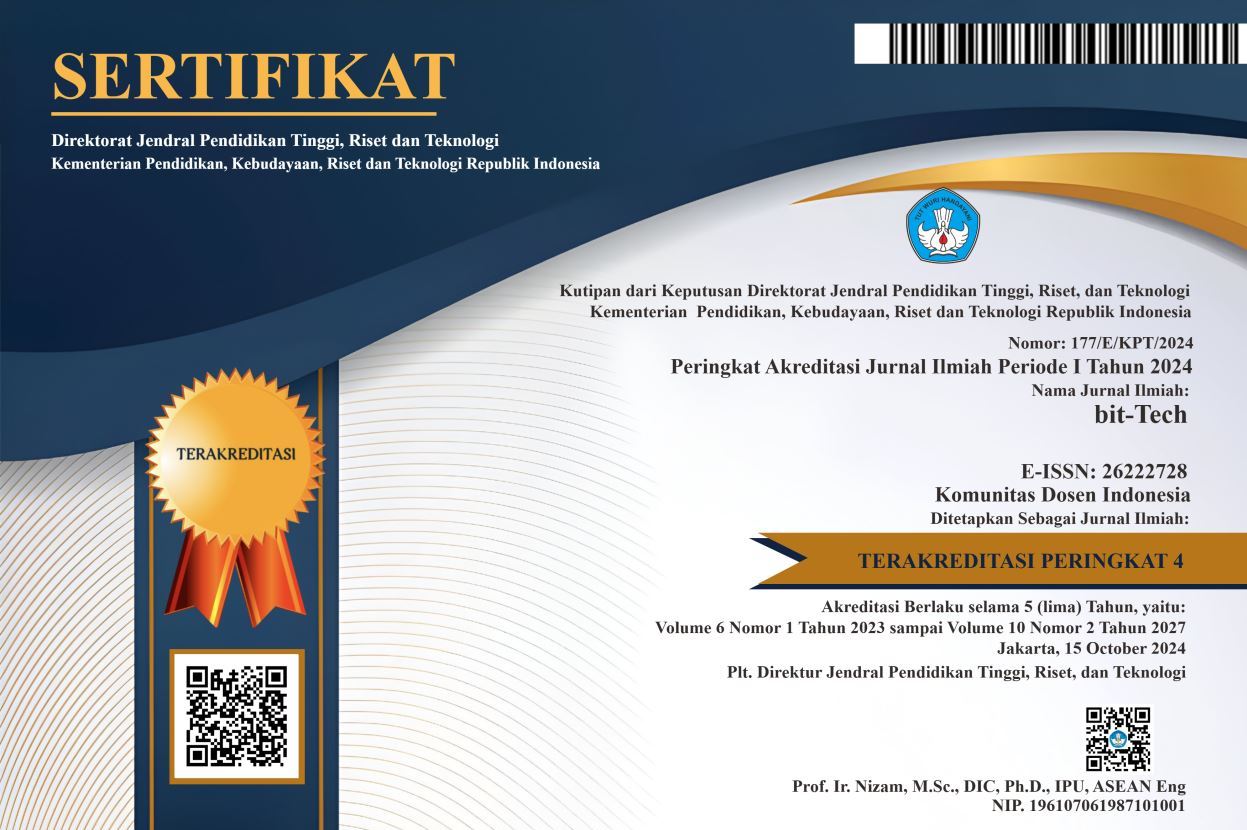Implementasi Malware Security and Proxy Layer 7 Protocol at Routerboard Mikrotik
DOI:
https://doi.org/10.32877/bt.v5i2.953
Keywords:
Malware, Proxy Server , Microtik , Media Social , Keyword
Abstract
In today's era along with the times, the internet network is needed in finding information because the internet is used as a source of information and exchange data in real time. Therefore, the internet is used in daily human activities, especially in the world of education. In the world of education, the internet is used as a means of online learning and as a source for finding learning materials related to education. In an educational institution, the number of users connected to the internet network is very large, making it possible for infiltration by malware and distribution. Malware activity is closely related to computer memory, computer performance and also network activity on computer systems making it difficult to access learning media sites in the network because there is no network security management that regulates the data exchange traffic of each user. The right solution to overcome this problem is to implement malware security and proxy server configurations as the method used to manage traffic for data exchange activities. The methodology used is dynamic analysis by analyzing malware on a system and looking at the activities or processes activated by the malware. By applying the security malware method and proxy server configuration, the quality of the network will be better because it minimizes malware traffic on the network system according to the configuration that is applied and also users will be restricted from accessing certain sites.
Downloads
References
Amarudin. 2018. “Analisis Dan Implementasi Keamanan Jaringan Pada Mikrotik Router Menggunakan Metode Port Knocking.” Seminar Nasional Sains dan Teknologi 2018: 1–7.
Bin Emdad, Md Rifat, and Md Shahin Khan. 2019. “A Standard Data Security Model Using AES Algorithm in Cloud Computing.” International Journal of Software & Hardware Research in Engineering 7(5).
Erick. 2016. “Klasifikasi Malware Trojan Ransomware Dengan Algoritma Support Vector Machine (SVM).” 2(1): 122–27. http://ars.ilkom.unsri.ac.id.
Erlando, Rinto, D Diana, and Maria Ulfa. 2020. “Penerapan Sistem Keamanan Firewall Pada Router Cisco 1841 Dan Monowall Pada Sistem Operasi Bsd (Berkeley Software Distribution).” Bina Darma …: 236–43. https://conference.binadarma.ac.id/index.php/BDCCS/article/view/1010.
Firdaus, Mochammad, Agung. 2011. “Mengenal Berbagai Jenis Malware Dan Pencegahannya.” Information Security: 5.
Hidayat, Arif. 2018. “Comparative Analysis of Mikrotik Site Filter Using Address List Techniques, Layer7 Protocols, Web Proxy, Mangle and DNS Static.” International Journal of Engineering and Technology(UAE) 7(3.4 Special Issue 4): 272–75.
Kurniawan, Heru, Joseph Dedy Irawan, and F.X Ariwibisono. 2020. “Implementasi Squid Proxy Pada Mikrotik Dan Monitoring Traffic Jaringan Berbasis Website.” JATI (Jurnal Mahasiswa Teknik Informatika) 4(2): 136–43.
Maulana, Muhammad Sony, and Muhammad Ryansyah. 2018. “Malware Security Menggunakan Filtering Firewall Dengan Metode Port Blocking Pada Mikrotik RB 1100AHx2.” Jurnal Sistem dan Teknologi Informasi (JUSTIN) 6(3): 112.
Noor Asyikin, Arifin, Noor Saputera, dan Edi Yohanes, and Staf Pengajar Jurusan Teknik Elektro Politeknik Negeri Banjarmasin Ringkasan. 2013. “Sistem Manajemen Hotspot Di Politeknik Negeri Banjarmasin Menggunakan Mikrotik Router Os.” Poros Teknik 5(1): 31–35. https://ejurnal.poliban.ac.id/index.php/porosteknik/article/view/18.
Ontoseno, R Dion Handoyo, Muhammad Nurul Haqqi, and Moch. Hatta. 2017. “Limitasi Pengguna Akses Internet Berdasarkan Kuota Waktu Dan Data Menggunakan Pc Router Os Mikrotik.” Teknika: Engineering and Sains Journal 1(2): 125.
Prama Wira Ginta, G. Putra Kusuma, E. Kusuma Negara. 2013. "ISSN:1858-2680." 9(2).
Putra, Eka, and Arifin. 2019. “Web Proxy Server Linux Debian 8 Jessie Untuk Blokir Situs Pada SMK Al-Washliyah Pasar Senen Kota Medan Provinsi Sumatera Utara.” Jurnal Ilmiah Core IT (x): 1–12.
Sondakh, Glend, Meicsy E I Najoan, and Arie S Lumenta. 2014. “Perancangan Filtering Firewall Menggunakan Iptables Di Jaringan Pusat Teknologi Informasi Unsrat.” Jurnal Teknik Elektro dan Komputer 3(4): 19–27.
Syarif, Abdusy, Afrius Setiawan, and Achmad Kodar. 2008. “H-1 QUALITY OF SERVICE (QoS) TEKNOLOGI STREAMING UNTUK APLIKASI SURVEILLANCE.” Seminar Nasional Aplikasi Teknologi Informasi 2008(Snati): 1907–5022.
Syarifudin, Akhmad. 2019. “Konfigurasi Routing.” : 1–7.
Tedyyana, Agus, and Supria Supria. 2018. “Perancangan Sistem Pendeteksi Dan Pencegahan Penyebaran Malware Melalui SMS Gateway.” INOVTEK Polbeng - Seri Informatika 3(1): 34.
Wongkar, Steven, Alicia Sinsuw, and Xaverius Najoan. 2015. “Analisa Implementasi Jaringan InternetDengan Menggabungkan Jaringan LAN Dan WLAN Di Desa Kawangkoan Bawah Wilayah Amurang II.” E-journal Teknik Elektro dan Komputer 4(6): 62–68.
Downloads
Published
How to Cite
Issue
Section
License

This work is licensed under a Creative Commons Attribution-ShareAlike 4.0 International License.
I hereby assign and transfer to bit-Tech all exclusive copyright ownership rights to the above work. This includes, but is not limited to, the right to publish, republish, downgrade, distribute, transmit, sell, or use the work and other related materials worldwide, in whole, or in part, in all languages, in electronic, printed, or any other form of media, now known or hereafter developed and reserves the right to permit or license a third party to do any of the above. I understand that this exclusive right will belong to bit-Tech from the date the article is accepted for publication. I also understand that bit-Tech, as the copyright owner, has sole authority to license and permit reproduction of the article. I understand that, except for copyright, any other proprietary rights associated with the work (e.g. patents or other rights to any process or procedure) must be retained by the author. In addition, I understand that bit-Tech permits authors to use their papers in any way permitted by the applied Creative Commons license.


 DOI :
DOI :
 Abstract views: 248
/
Abstract views: 248
/  PDF downloads: 231
PDF downloads: 231











